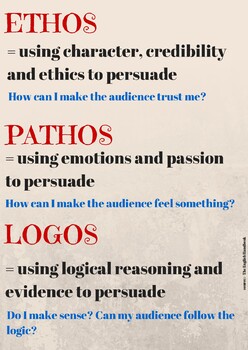

Leith goes into depth regarding the five. While Aristotle’s three persuasive appeals make appearances throughout the book, there is so much more to Words Like Loaded Pistols. We'll study the types of support you can use to substantiate your thesis, and look at some of the common logical fallacies, in order to avoid them in your writing. Logos uses logic, reasoning, evidence, and facts to support an argument. If you can create something with ethos, logos, and pathos peppered throughout, and tie it all into your audience’s belief system, you will have a very strong argument. Giving reasons is the heart of argumentation, and cannot be emphasized enough. We'll look at deductive and inductive reasoning, and discuss what makes an effective, persuasive reason to back up your claims. This will be the most important technique we will study, and Aristotle's favorite. Logos (Logical) means persuading by the use of reasoning. Language choice affects the audience's emotional response, and emotional appeal can effectively be used to enhance an argument. We can look at texts ranging from classic essays to contemporary advertisements to see how pathos, emotional appeals, are used to persuade. Pathos (Emotional) means persuading by appealing to the reader's emotions. One of the central problems of argumentation is to project an impression to the reader that you are someone worth listening to, in other words making yourself as author into an authority on the subject of the paper, as well as someone who is likable and worthy of respect.

Persuasion is achieved by using one or more of these three elements. We tend to believe people whom we respect. Ethos, pathos, and logos are all modes of persuasion or appealing to an audience under the rhetorical mode of argument. The Greek philosopher Aristotle divided the means of persuasion, appeals, into three categories- Ethos, Pathos, Logos.Įthos (Credibility), or ethical appeal, means convincing by the character of the author. The goal of argumentative writing is to persuade your audience that your ideas are valid, or more valid than someone else's. These are classical Greek terms, dating back to Aristotle, who is traditionally seen as the father of. A General Summary of Aristotle's Appeals. Rhetorical appeals refer to ethos, pathos, and logos.


 0 kommentar(er)
0 kommentar(er)
